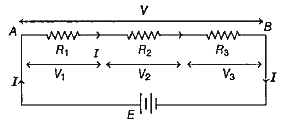Define resistance. Derive an expression for net resistance, when resistors are connected in
series,
Resistance is defined as the ratio of the potential difference applied across the conductor to the current flowing through it.
Mathematically, R=VI
Its SI unit is ohm (Ω).
(a) Resistance in Series Resistors are said to be connected in series, if the same current is flowing through each resistor when different potential difference is applied across the combination.

Consider three resistance R1,R2andR3 are connected in series. Let V be the potential difference applied across A and B using the battery (E) and the same current (I) is passing through each resistance. If V1,V2andV3 be the potential difference across R1,R2andR3, respectively.
According to Ohm.s law, we know that
V1=IR1,V2=IR2,V3=IR3
But V=V1+V2+V3=IR1+IR2+IR3
V=I(R1+R2=R3)
If RS is the equivalent resistance of the given series combination of resistance.

Then, V=IRS
∴RS=VI=II(R1+R2+R3)⇒RS=R1+R2+R3
Thus, the equivalent resistance of a number of resistors connected in series is equal to the sum of individual resistance.
Similar Questions
Knowledge Check
The equivalent resistance of resistors connected in series is always
AEqual to the mean of component resistorsBLess than the lowest of component resistorsCIn between the lowest and the highest of component resistorsDEqual to sum of component resistorsThe equivalent resistance of n identical resistors connected in parallel si x. If the resistors are connected in series, the equivalent resistance would be.
An xBn2xCxnDnxThe equivalent resistance of n identical resistors connected in parallel is x. If the resistors are connected in series, the equivalent resistance would be
An xBn2xCx/nDx/n2
What is Ohm's law ? How is it represented graphically ? Derive an expression for the resultant resistance of a series combination of resistors.
View SolutionWhen two resistors are connected in series with a cell of emf 2 V and negligible internal resistance, a current of 25A flows in the circuit. When the resistors are connected in parallel the main current is 53A. Calculate the resistances.
View SolutionWhen two resistors of resistances R1andR2 are connected in parallel, the net resistance is 3Ω. When connected in series, its value is 16Ω. Calculate the values of R1andR2.
View SolutionWhen resistors are connected in series, then net resistance_____
View SolutionR is the equivalent resistance of n resistors of same resistance in series. If the connection is turned parallel then equivalent resistance will be:
View Solution
